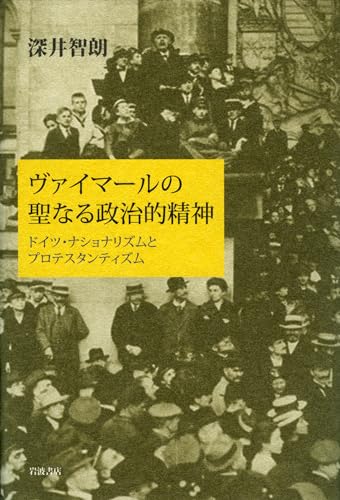4 0 0 0 ハイデガーとヤスパース(上)
- 著者
- 深井 智朗
- 出版者
- 金城学院大学
- 雑誌
- 金城学院大学論集. 人文科学編 (ISSN:04538862)
- 巻号頁・発行日
- vol.9, no.1, pp.64-85, 2012
3 0 0 0 OA 小柳敦史著『トレルチにおける歴史と共同体』
- 著者
- 深井 智朗
- 出版者
- The Japan Society of Christian Studies
- 雑誌
- 日本の神学 (ISSN:02854848)
- 巻号頁・発行日
- vol.55, pp.172-177, 2016 (Released:2018-02-22)
2 0 0 0 OA パウル・アルトハウスと保守革命
- 著者
- 深井 智朗 Tomoaki Fukai
- 出版者
- 金城学院大学
- 雑誌
- 金城学院大学論集. 人文科学編 = Treatises and studies by the Faculty of Kinjo Gakuin University. Studies in Humanities (ISSN:18800351)
- 巻号頁・発行日
- vol.10, no.1, pp.57-71, 2013-09-30
2 0 0 0 OA 近代世界とプロテスタンティズム : ヴォルフハルト・パネンベルクの視点
- 著者
- 深井 智朗
- 雑誌
- 聖学院大学総合研究所紀要 = Seigakuin University General Research Institute Bulletin (ISSN:09178856)
- 巻号頁・発行日
- no.No.16, pp.357-394, 2000-02
1 0 0 0 OA 神学は神学を越えて神について語ることができるのか 二〇世紀神学史の遺産と可能性
- 著者
- 深井 智朗
- 出版者
- 宗教哲学会
- 雑誌
- 宗教哲学研究 (ISSN:02897105)
- 巻号頁・発行日
- vol.26, pp.1-18, 2009 (Released:2019-09-18)
It was Ludwig Feuerbach’s criticism of religion that urged reconsideration in historical study of modern Protestant theology. Theology since then has been aware of the problem in some way or another, “what can theology talk about God after Feuerbach’s criticism of religion?”. Theological confrontation with Feuerbach can be summarised into the following three types. The first type is “psychological approach in theology,” which is an attempt to prove truthfulness of religiosity in human despite Feuerbach’s criticism. The second type presents a new method in theological epistemology, criticising such psychological approach and developing a paradoxical criticism to Feuerbach. This was established by K. Barth, which can be called “modernization of theological method” by reinterpreting the concept of revelation. The third type is a critical integration of those two types above, which we can find in the methods by W. Pannenberg and D. Korsch. Upon the recognition of these three types of attempts, I shall suggest a new viewpoint in order to work on the current problems over God, reconstructing the second type of discussion. That is, in particular, to regard Karl Barth’s theological attempt as a “theological deconstruction”.
1 0 0 0 OA 1913年のルドルフ・ブルトマン : 彼は神学的アヴァンギャルドなのか
- 著者
- 深井 智朗 Tomoaki Fukai
- 出版者
- 金城学院大学
- 雑誌
- 金城学院大学論集. 人文科学編 = Treatises and studies by the Faculty of Kinjo Gakuin College (ISSN:18800351)
- 巻号頁・発行日
- vol.9, no.2, pp.120-132, 2013
1 0 0 0 IR 近代世界とプロテスタンティズム--ヴォルフハルト・パネンベルクの視点
- 著者
- 深井 智朗
- 出版者
- 聖学院大学総合研究所
- 雑誌
- 聖学院大学総合研究所紀要 (ISSN:09178856)
- 巻号頁・発行日
- no.16, pp.357-394, 1999
- 著者
- 深井 智朗
- 雑誌
- 聖学院大学総合研究所紀要 = Seigakuin University General Research Institute Bulletin (ISSN:09178856)
- 巻号頁・発行日
- no.No.15, pp.389-423, 1999-03
1 0 0 0 OA 近代ドイツにおける宗教と出版社の関係についての研究
本研究では、近代ドイツ宗教思想史研究に社会史的な視点を導入するために、従来の思想史研究の前提であった「著者‐読者」ではなく、「著者‐編集者(出版社)‐読者」という関係モデルを提示した。なぜなら、近代以後の世界では思想もまた市場化し、編集者、あるいは出版社の媒介なしには、思想を知的市場にもたらすことはできなくなったからである。またこのような仕組みの中では、思想を市場に届けるためには、出版社が大きな力をもつようになり、編集者や出版社の思想が、著者に大きな影響力を与えるようになるからである。そのことを近代ドイツの2つの宗教出版社の資料をサンプルに解明した。
1 0 0 0 OA 近代ドイツにおける宗教思想と「読者としての大衆」の関係についての研究
本研究では、高度情報社会における宗教思想家(あるいは団体)と、それを受け取る「読者としての大衆」との関係の変化を、ドイツのヴィルヘルム期に出版社(とりわけオイゲン・ディーデリヒス出版社とクリスチャン・カイザー出版社)の歴史をサンプルに、以下の2点から考察した。その結果以下の結論を得た。すなわち、信教の自由が保障され、宗教が市場した社会では、宗教的思想家と読者との関係が逆転し、著者が読書に影響を及ぼし、知識や宗教的情報を伝達するのではなく、「読者としての大衆」の嗜好が宗教思想家の考えを形成している。
- 著者
- 深井 智朗
- 出版者
- 東洋英和女学院大学大学院
- 雑誌
- 東洋英和大学院紀要 = Journal of the graduate of Toyo Eiwa University (ISSN:13497715)
- 巻号頁・発行日
- vol.13, pp.65-80, 2017-03-15
Although it has been well known that Erich Fromm and Paul Tillich were close in Frankfurt as colleagues and in the United States as political refugees, the sources and letters that illuminate their relationship have been few. However, recently discovered letters and sources demonstrate that they continued to form a close relationship through “the Council for a Democratic Germany” and also in private study groups in the United States. By analyzing these letters, this paper clarifies the intellectual exchanges of these two men in their period of exile.
1 0 0 0 IR パウル・アルトハウスと保守革命
- 著者
- 深井 智朗 Tomoaki Fukai
- 出版者
- 金城学院大学
- 雑誌
- 金城学院大学論集. 人文科学編 (ISSN:18800351)
- 巻号頁・発行日
- vol.10, no.1, pp.57-71, 2013-09
- 著者
- 深井 智朗
- 出版者
- 国際日本文化研究センター
- 雑誌
- 日本研究 (ISSN:09150900)
- 巻号頁・発行日
- vol.45, pp.139-154, 2012-03
二〇〇九年三月、一九三三年のナチスの焚書の際に非ドイツ的な思想と判断され、その後発禁処分、断裁処分となったパウル・ティリッヒの『社会主義的決断』の初版の一冊が京都大学文学部長を歴任した神学者有賀鐵太郎の蔵書から発見された。この書物は戦後一九四八年になってリプリント版が出版され、それによって広く知られ、読まれるようになったが、初版は大変貴重なものである。 本論は、(1)この書物に著者ティリッヒ自身や所有者である有賀によって書き込まれたさまざまな情報、また京都大学文書館、ハーヴァード大学アンドーバー神学図書館ティリッヒ文庫、さらには東京の国際文化会館で同時期に発見したティリッヒと有賀との往復書簡、有賀の日記やティリッヒの未出版の諸文書、また『社会主義的決断』の出版元ポツダムのアルフレット・プロッテ出版社についてブランデンブルク州文書館に残されていた諸資料に基づいて、この書物が有賀の手に届いた経緯を解明しようとするものである。また、(2)この書物がティリッヒと有賀とのその後の交流において果たした役割についても解明した。そしてさらに、(3)ドイツで生まれ、ニューヨークで亡命知識人として生きたティリッヒと欧米の神学を日本で最初に本格的に受容した京都の神学者有賀鐵太郎との知的交流を「同時代史」という視点から考察した。
1 0 0 0 IR 超越を認識するための人間学的な前提 : ルドルフ・ブルトマンにおける超越の認識
- 著者
- 深井 智朗 フカイ トモアキ
- 雑誌
- 聖学院大学総合研究所 (ISSN:09178856)
- 巻号頁・発行日
- no.32, 2005-03
- 著者
- 深井 智朗
- 出版者
- 聖学院大学
- 雑誌
- 聖学院大学総合研究所紀要 (ISSN:09178856)
- 巻号頁・発行日
- vol.49, pp.131-159, 2011-01-31

